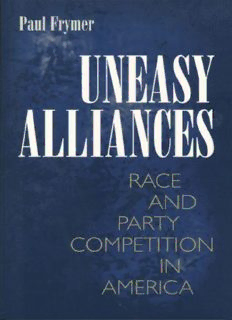
Uneasy Alliances: Race and Party Competition in America PDF
Preview Uneasy Alliances: Race and Party Competition in America
UNEASY ALLIANCES princeton studies in american politics: historical, international, and comparative perspectives series editors Ira Katznelson, Martin Shefter, Theda Skocpol, eds. A list of titles in this series appears at the back of the book UNEASY ALLIANCES RACE AND PARTY COMPETITION IN AMERICA Paul Frymer PRINCETON UNIVERSITY PRESS PRINCETON, NEW JERSEY Copyright(cid:1) 1999 by Princeton University Press Published by Princeton University Press, 41 William Street, Princeton, New Jersey 08540 In the United Kingdom: Princeton University Press, Chichester, West Sussex All Rights Reserved Library of Congress Cataloging-in-Publication Data Frymer, Paul, 1968– Uneasy alliances : race and party competition in America / Paul Frymer. p. cm.— (Princeton studies in American politics) Revision of the author’s thesis (Ph. D.)—Yale University, 1995. Includes bibliographical references and index. ISBN 0-691-05795-8 (cloth : alk. paper). — ISBN 0-691-00464-1 (pbk. : alk. paper) 1. United States—Race relations—Political aspects. 2. Racism— Political aspects—United States. 3. United States—Politics and government—1865–1900. 4. United States—Politics and government—20th century. 5. Political parties—United States— History. 6. Afro-Americans—Civil rights—History. I. Title. II. Series. E185.615.F79 1999 324(cid:2).086(cid:2)930973—dc21 98-38411 This book has been composed in Sabon The paper used in this publication meets the minimum requirements of ANSI/NISO Z39.48-1992 (R1997) (Permanence of Paper) http://pup.princeton.edu Printed in the United States of America 1 3 5 7 9 10 8 6 4 2 (Pbk.) 1 3 5 7 9 10 8 6 4 2 To My Parents Barbara and Murry Frymer This page intentionally left blank Contents List of Illustrations ix Acknowledgments xi Chapter 1. Introduction 3 Chapter 2. Competitive Parties and the “Invisibility” of Captured Groups 27 Chapter 3. National Party Competition and the Disenfranchisement of Black Voters in the South, 1866–1932 49 Chapter 4. Capture Inside the Democratic Party, 1965–1996 87 Chapter 5. Party Education and Mobilization and the Captured Group 120 Chapter 6. Black Representation in Congress 140 Chapter 7. Is the Concept of Electoral Capture Applicable to Other Groups? The Case of Gay and Lesbian Voters in the Democratic Party and the Christian Right in the Republican Party 179 Index 207 This page intentionally left blank Illustrations FIGURES 2.1 Distribution of ideology on nonracial dimensions 31 2.2 Putative distribution after African American enfranchisement 33 2.3 Politics in three dimensions 46 3.1 The electoral college vote in 1884 77 5.1 Third congressional district, Connecticut, democratic performance 129 5.2 Third congressional district, Connecticut, persuasion percentage 130 5.3 Percentage persuadable by percentage black (precincts in New Haven, 1992) 131 5.4 Persuadable voters by income level 132 6.1 Mentions of Congressional Black Caucus (Congressional Quarterly Weekly) 152 6.2 Mentions of Congressional Black Caucus (New York Times) 153 6.3 Mentions of Congressional Black Caucus (Washington Post) 153 6.4 Mentions of Congressional Black Caucus and AFL-CIO (Congressional Quarterly Weekly) 154 TABLES 3.1 Southern congressional districts in 1883 with majority or near majority African American populations 76 4.1 Black voting size (by state) versus votes for Reagan, 1984 113 5.1 Party contact and voting by income group 125 5.2 Effects of party contact on campaign interest 134 5.3 Change in respondent interest, controlling for party contact 135 5.4 Effects of party contact on general political efficacy 136 6.1 Legislative agenda of the Black Caucus by issue, 103rd Congress 150 6.2 Public activities of and stances by the Congressional Black Caucus as reported by three major journals, 1970–1976 155 6.3 Public stances by the Congressional Black Caucus, by subject matter 163
Description: